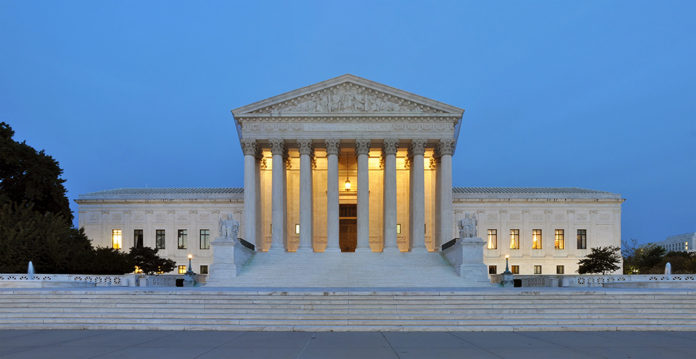
Salvatore Ambrosino
The Supreme Court of the United States’ (SCOTUS) conservative majority appears willing to preserve the Obama administration’s landmark Patient Protection and Affordable Care Act (ACA), the most challenged statute in modern American history.
The Nov. 10 hearing lays at stake the demolition of the ACA. In turn, the health insurance marketplace and America’s baseline in healthcare fear extinction.
Justice Amy Coney Barrett’s confirmation stirred the pot amongst Democrats in Congress, impelling the worst nightmares of court ordered reversals.
The ACA’s seventh challenge in nearly a decade prompts uninspired reactions from even conservative legal scholars opposing the statute as well as the deteriorating lawsuit questioning its constitutionality.
Nevertheless, the Trump administration’s latest strike on Obama-era policy preys on the Supreme Court’s 2012 5-4 ruling on Congress’s right to levy Obamacare as a tax. Since Congress’s 2017 decision to zero the individual insurance mandate’s tax penalty effective 2019, the mandate is no longer a tax, rendered unconstitutional.
Republican respondents contend the existence of the ACA is so tied to the individual mandate’s punitive tax that all other programs in the 2,000 page law are to be struck from United States legislation as well.
“It’s at odds with how Congress and the President understood the amendment,” Solicitor General of California Michael Mongan said in his opening defense of the ACA.
Severability, the legal doctrine at the center of the case, takes a side by presuming Congress wanted statutes separate from the affected section preserved if not openly conflicted.
In the words of Chief Justice John Roberts in Seila Law v. Consumer Financial Protection Bureau, it’s “a scalpel rather than a bulldozer.”
Texas Solicitor General Kyle D. Hawkins, classed by Texas Review of Law & Politics amongst conservative all stars Justice Clarence Thomas and federalist activist Leonard Leo, led the 18-state effort (including Florida) through the Fifth Circuit Appeals Court to strike down Obamacare in its present form.
“This case should be resolved on the basis of three operative provisions,” Hawkins explaining that the ACA should be killed: layman’s terms:
- The federal government has no right to command citizens to obtain healthcare it deems suitable.
- The erasure of the law’s penalty renders it unconstitutional.
- Because the law no longer bears a tax penalty, the remainder of the ACA should be inactive.
These claims are not untrue.
Schrödinger’s tax engages healthy skepticism considering that without the guise of Congress’s power to raise revenue, the individual insurance mandate is, in its leftovers, a naked command. A disrobed breach of power that would, in almost any other judicial review, be voided.
On March 23, 2010, the ACA was ratified. Lawmakers at the time claimed the tax penalty, then $95 per adult, was an essential part to the marketplace reforms the statute set out to achieve. The enshrinement of this now inoperative language casually acts as high-ground for opponents.
The question of California v. Texas must at first be considered through today’s scope and by its prior, rather effective moral suasion.
Former Solicitor General of the United States Donald Verrilli said the mandate was crucial at the time to create a new insurance market, with subsidies as “carrots” and the requirement to purchase or otherwise obtain insurance under threat of penalty as a “stick.”
“It’s turned out that the carrots work without the stick,” Verilli said, explaining to Justice Roberts that the policy’s underlying success was based on the individual’s thus proven desire to obtain affordable healthcare and that the penalty was no longer necessary.
Since its introduction in 2010, an estimated 23 million U.S. citizens have been covered under the health care law, constituting the baseline for American health coverage, as well as nearly a fifth of the United States’ economy.
The ramifications of an adverse ruling, at this point in time, would go beyond depriving Americans of coverage.
Faulted revenue streams stretched thin over the Recession have contributed to a reduction in health screenings, leading also to a reduction in revenue for the American healthcare system. Further, the American healthcare system is unlikely to cope with an influx of patients in late-stage crises through a now mountainous pandemic.
Societal collapse considered, popularity is irrelevant. The Supreme Court remains the voice of the law and of the Constitution. Perhaps the Justices let it be known impending adversity does not always grant instantaneous exceptions to the rule of law.
So if the court rules the ACA unconstitutional on the grounds of not appropriately exercising Congress’s taxing powers, so-be-it. The House and Senate relay the responsibility of quickly purifying its demerits on behalf of the dying.
Whether or not Congress actually pushes through a revised health care law fitting within the provisions of the Constitution conclusively measures the electorate’s representation.
However engrossing speculative fiction is at times, let’s not kid. Even the majority of conservative Justices on the Supreme Court know that the Constitution is not a suicide-pact.
A constitutional repeal of the ACA would blindly engender American life with distress, worsening a mid-pandemic dependency on accessible medical care and a newly felt invisibility by the American people.
Despite the Act’s exact constitutionality, a hardline dissent from the circumstances of Our Nation at present would compellingly rule society backwards.
The conservative majority, notably key Justices Brett Kavanaugh and Roberts, portray themselves listless as G.O.P. counsel members mockup a haphazard and partisan theory of standing likely to backfire on their own states ill from the novel coronavirus.







